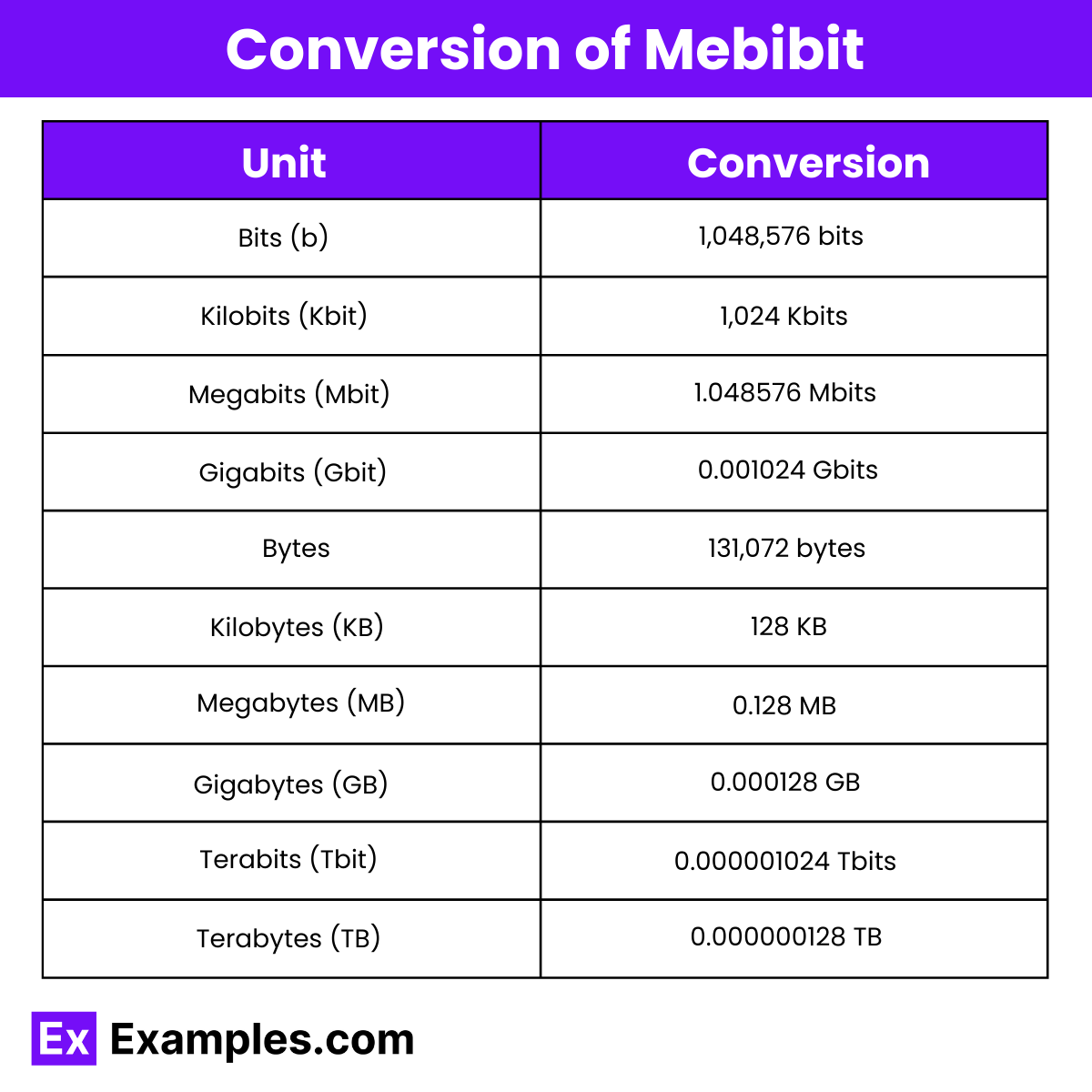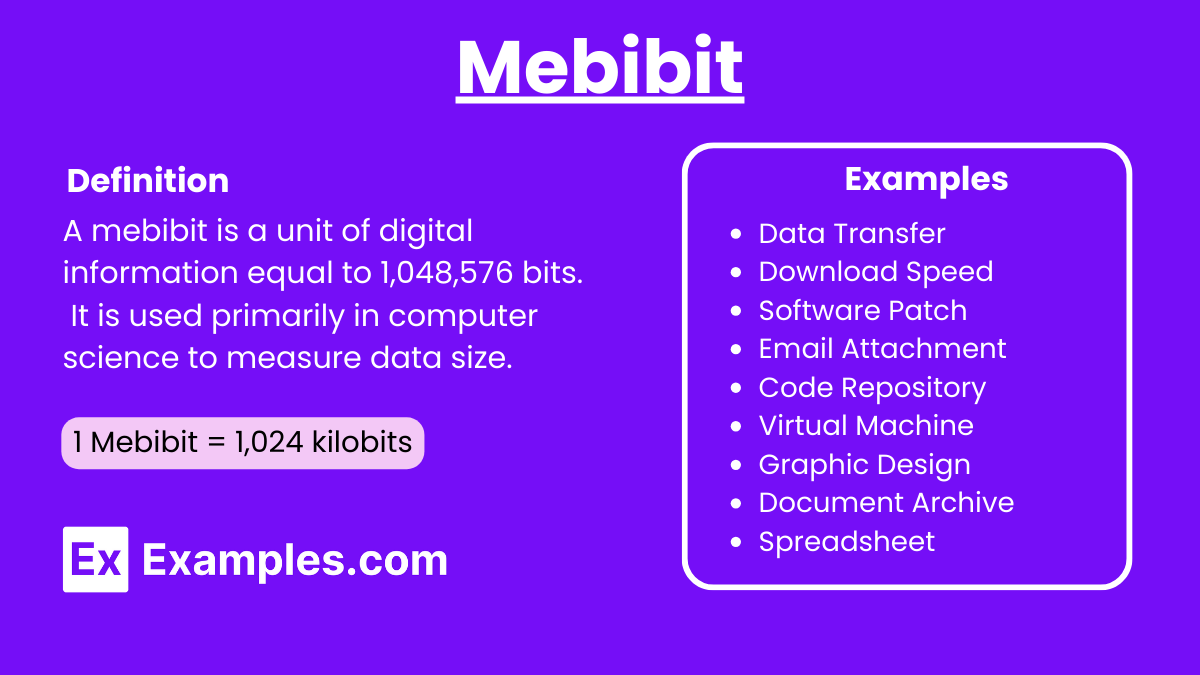Mebibit – 20 Examples, Conversion Chart, Uses
A mebibit (Mibit) is a unit of digital information used to measure data storage and transfer. In the realm of cloud computing, it plays a crucial role in determining data transfer rates and storage capacities. As digital communication and communication technology evolve, understanding units like mebibit becomes essential for optimizing network performance and efficiency. This knowledge aids in better management of digital resources and enhances the efficiency of modern communication systems.
What is Mebibit?
A mebibit (Mibit) is a unit of digital information equal to 1,048,576 bits. It is commonly used in measuring data storage and transfer rates in digital and communication technologies.
Examples of Mebibit
- File Size: A small image file might be 1 Mibit.
- Data Transfer: A network transfer rate could be 5 Mibits per second.
- Memory: An old computer might have 128 Mibits of RAM.
- Download Speed: Downloading a song at 3 Mibits per second.
- Cloud Storage: A document stored in the cloud using 2 Mibits.
- Streaming: Streaming a short video clip that uses 10 Mibits.
- Backup: Backing up a small set of files totaling 15 Mibits.
- Firmware: A device firmware update file of 8 Mibits.
- Game Save: A save file for a video game that is 4 Mibits.
- Software Patch: A software patch update of 12 Mibits.
Conversion of Mebibit

| Unit | Conversion from Mebibit (Mib) |
|---|---|
| Bits (b) | 1 Mib = 1,048,576 bits |
| Kilobits (Kb) | 1 Mib = 1,024 Kb |
| Gigabits (Gb) | 1 Mib = 0.001024 Gb |
| Terabits (Tb) | 1 Mib = 0.000001024 Tb |
| Bytes (B) | 1 Mib = 131,072 Bytes |
| Kilobytes (KB) | 1 Mib = 128 KB |
| Megabytes (MB) | 1 Mib = 0.128 MB |
| Gigabytes (GB) | 1 Mib = 0.000128 GB |
| Terabytes (TB) | 1 Mib = 0.000000128 TB |
Mebibit to Bits
1 Mibit is equivalent to 1,048,576 bits. Bits are the basic unit of digital information.
Mebibit to Kilobits (Kbit)
1 Mibit is equal to 1,024 Kbits. Kilobits are commonly used to measure data transfer rates, especially in older or lower-bandwidth communication systems.
Mebibit to Megabits (Mbit)
1 Mibit is approximately 1.048576 Mbits. Megabits are often used in networking to describe data transfer speeds.
Mebibit to Gigabits (Gbit)
1 Mibit is 0.001024 Gbits. Gigabits are used for high-speed network data transfers and larger data storage.
Mebibit to Bytes
1 Mibit equals 131,072 bytes. Bytes are the standard unit of information storage and are often used in file sizes.
Mebibit to Kilobytes (KB)
1 Mibit is 128 KB. Kilobytes are used to describe file sizes for documents, images, and small files.
Mebibit to Megabytes (MB)
1 Mibit is approximately 0.128 MB. Megabytes are used for larger files such as high-quality images and a files.
Mebibit to Gigabytes (GB)
1 Mibit is 0.000128 GB. Gigabytes are used for very large files and storage capacities.
Mebibit to Terabits (Tbit)
1 Mibit is 0.000001024 Tbits. Terabits are used in describing extremely high data transfer rates in large networks.
Mebibit to Terabytes (TB)
1 Mibit is 0.000000128 TB. Terabytes are used for describing massive storage capacities in data centers and cloud storage services.
Importance of Mebibit
Accuracy in Data Measurement:
- This precision is crucial for tasks involving large data transfers, ensuring there is no ambiguity in data size.
Standardization in Computing:
- This standardization helps eliminate confusion caused by the historical use of metric prefixes for binary quantities.
Consistency in Storage and Memory:
- In computer memory and storage, binary units align more closely with the architecture of computer systems, which operate on binary logic.
Network and Data Communication:
- This clarity helps in optimizing network performance and troubleshooting data transfer issues.
Where do you use of Mebibit
1. Data Transfer Rates
- Network Speeds: Data transfer speeds in networking can be measured in mebibits per second (Mibps).
- Storage Devices: Communication rates between storage devices and systems, such as hard drives and SSDs, might use mebibits to represent bandwidth.
2. File Sizes and Storage Capacity
- System Memory: Technical specifications for system memory, such as RAM, might use mebibits to accurately describe capacities.
- Firmware and Software Updates: When describing the size of firmware or software updates, using mebibits ensures precise communication of the data size.
3. Computer Architecture
- Cache Memory: The size of cache memory in processors is often expressed in mebibits to accurately reflect binary capacities.
- Embedded Systems: In embedded systems, where resources are limited and optimization is critical, using mebibits helps in detailed resource allocation and management.
4. Networking and Telecommunications
- Data Channels: The capacity of data channels in communication systems can be measured in mebibits, ensuring precise understanding of the channel’s capability.
- Bandwidth Allocation: Network administrators might allocate bandwidth in mebibits to optimize the use of available resources.
5. Scientific Computing
- Simulation Data: Large-scale simulations generate vast amounts of data, often quantified in mebibits to ensure precise measurements.
- Data Analysis: During data analysis, especially with large datasets, using mebibits can help maintain consistency in data representation.
What is the Difference between Mebibit and Mebibyte
| Aspect | Mebibit (Mib) | Mebibyte (MiB) |
|---|---|---|
| Definition | A unit of digital information equal to 2^20 bits. | A unit of digital information equal to 2^20 bytes. |
| Size | 1 mebibit = 1,048,576 bits | 1 mebibyte = 1,048,576 bytes |
| Symbol | Mib | MiB |
| Binary Value | 1 Mib = 2^20 bits | 1 MiB = 2^20 bytes |
| Decimal Value | 1 Mib = 1,048,576 bits | 1 MiB = 1,048,576 bytes |
| Common Use | Network speeds, data transfer rates | File sizes, storage capacities |
| Conversion | 1 Mib = 128 Kibibytes (KiB) | 1 MiB = 8 Mebibits (Mib) |
| Example Context | Internet connection speeds (e.g., 100 Mibps) | Hard drive capacities (e.g., 256 MiB) |
How does a mebibit differ from a megabit?
A mebibit is 1,048,576 bits (binary), while a megabit is 1,000,000 bits (decimal).
How many mebibits are in a mebibyte?
There are 8 mebibits in one mebibyte.
Why use mebibits instead of megabits?
Mebibits provide precise measurements based on binary multiples, useful in technical contexts.
What is the symbol for mebibit?
The symbol for mebibit is Mib.
Where is the term mebibit commonly found?
Mebibits are commonly used in networking, data transfer specifications, and computer architecture.
How many bits are in a mebibit?
There are 1,048,576 bits in a mebibit.
Can mebibits be used for storage measurements?
Yes, mebibits can be used to describe storage sizes, but mebibytes are more common.
What’s the practical application of mebibits?
Mebibits are used to measure digital data transfer speeds, such as network bandwidth.
Why are mebibits important in computing?
Mebibits provide accurate binary measurements crucial for precise data handling in computing.
Are mebibits and megabits interchangeable?
No, mebibits and megabits are not interchangeable due to different binary and decimal bases.


